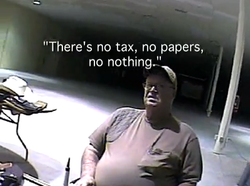Virginia Tech massacre survivor captures shady gun dealers on hidden camera
 Colin Goddard suffered four gunshot wounds when a fellow Virginia Tech student who was mentally ill opened fire at the Blacksburg campus in 2007, killing 32 people and wounding many others before turning the gun on himself.
Colin Goddard suffered four gunshot wounds when a fellow Virginia Tech student who was mentally ill opened fire at the Blacksburg campus in 2007, killing 32 people and wounding many others before turning the gun on himself.Determined to ensure something like that could never happen again, the 24-year-old Goddard began visiting gun shows this past summer -- and he took along a hidden camera to record just how easy it was for anyone to purchase a firearm.
His goal? To get Congress to take action so people can't buy weapons at gun shows without a background check.
"It is time -- actually, way past time -- for America to close the loophole that allows people who can't legally buy a gun from a gun dealer to literally buy one in the back corner of the same convention center," says Goddard, who turned the guns he purchased over to local police.
The federal Brady Law requires criminal background checks of people who buy guns from federally licensed dealers, but unlicensed private sellers are not required to conduct background checks. That loophole is a special problem at gun shows, where in most states anyone including convicted felons, domestic violence abusers and people with dangerous mental illnesses can buy weapons from unlicensed dealers, no questions asked.
Gun shows also supply firearms for criminals. A 2000 report [pdf] from the federal Bureau of Alcohol, Tobacco and Firearms found that shows are the second-leading source of illegally diverted guns in the United States, trailing only corrupt federally licensed dealers. Gun shows have also been identified as an important source of weapons for drug cartels operating in the Houston area, for gangs in New Orleans, and for criminals in Richmond, Va., according to a 2007 Justice Department report [pdf].
To date, only seven out of 50 states have completely closed the gun show loophole -- and none of them are in the South. Ten other states have taken limited steps, including North Carolina, which requires individuals seeking to purchase a handgun to get a permit that involves a background check, and certain counties in Florida that require background checks on all private sales of handguns at gun shows. But 33 states do not have any restrictions in place.
Bills have been introduced in the U.S. House (H.R. 2324) and Senate (S. 843) to close the gun show loophole. That legislation is supported by the Brady Campaign to Prevent Gun Violence, where Goddard now works.
Of the 49 current co-sponsors of the House bill, only three are from the South -- two from Virginia (Gerry Connolly and James Moran) and one from Texas (Sheila Jackson-Lee). Of the 15 current co-sponsors in the Senate, none represent Southern states.
To get Americans interested in the initiative, the Brady Campaign has put together a short video with highlights of Goddard's hidden-camera footage, which includes footage from Texas, Virginia, Minnesota and Ohio. The image above is a still from the video.
"I want to see an America that wants background checks on every gun sale," Goddard says. "There's no background check, there's no gun, there's no excuses."
Watch the video with the undercover footage here:
Tags
Sue Sturgis
Sue is the former editorial director of Facing South and the Institute for Southern Studies.
